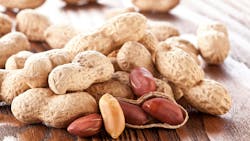Mars invests in peanut science to protect supply for its snack brands
As one of the top five peanut buyers worldwide, Mars Inc. has a vested interest in securing an adequate and disease-free supply. At the same time, crop losses due to pests and disease mean that up to 30% of peanut production never make it from the pod to the plate, the company notes. To combat the pressures on these essential ingredients for its brands, such as Snickers and M&M's, Mars has invested $10 million in natural crop breeding and plans to invest $5 million more over the next five years.
Mars is formalizing its agri-science support for peanut research with a new initiative, the Mars Protect the Peanut Plan.
Read more about protein snacks on VendingMarketWatch.com
- Tuna LTO offers an on-the-go extra spicy kick
- Meat snack collaboration brings bold flavor mashups
- Protein nut rolls for snackers seeking natural, organic treat
- Food trends reflect evolving consumer behaviors and food chain adjustments
- Premium Brands Holdings Corp. makes moves
- Aramark Collegiate Hospitality data reveals student dining and hospitality trends
